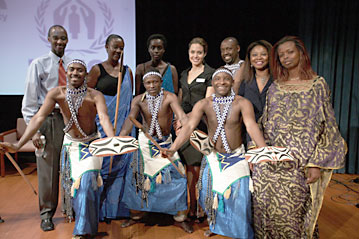It has been argued that it was important not to be excessively pessimistic about Africa, nor to over generalise. Growth on average was in the region of 4-5% per annum. Some countries were lagging, but in 2002, the latest year for which figures were available, 25 countries had raised average living standards and only 9 had failed to do so. Overall, per capita income had risen by 2% in 2002. Social indicators were also improving.
The case for large rises in aid to Africa was being made with great energy. The peg was the achievement of the MDGs. The meeting title referred to a "doubling", using this as a metaphor for any large, discontinuous and short-term increase in aid. It was important to note that the increase would be larger than a doubling in Africa, given the special development needs in the region. Amongst the main protagonists, Tony Killick identified the Millennium Project in New York (led by Jeff Sachs), the work on the International Financing Facility in the Treasury, and the priority given to the issue by the Prime Minister, including through the Africa Commission.
Tony Killick's key argument was that the emphasis on large and quick increases in aid would (a) undermine efforts to improve the effectiveness of aid because quality would suffer and (b) because the resulting additions to already high aid dependency would undermine accountability, ownership and institution-building in African countries.
Aid was already very highly concentrated on Africa, and the region exhibited a high dependency. For example, for the top half of recipients, aid accounted for 17% of GNI, 108% of gross domestic capital formation and 49% of imports. The risks with rapidly increasing aid included: (a) diminishing returns; (b) limited absorptive capacity (especially because of weak institutions and a brain drain); (c) the undermining of domestic ownership; (e) high fiduciary risk because of weak budget institutions (associated with fungibility, poor accountability and corruption); (f) macroeconomic problems created by large additional inflows, particularly Dutch Disease; and (g) negative effects on domestic accountability, the strengthening of local institutions and governments' willingness to tackle deep-rooted problems (moral hazard).
Germany also argued that Without strong institutions and professional capacities, a doubling of aid is not very useful.
Many believe doubling of aid to Africa will only give room for her leaders to acquire more riches.
What is your argument?

About YFAR
The purpose of this blog is to discuss and find out ways to re-engineer Africa and position it in a glorified world. To portray a true picture of Africa, to promote direct investment and sustainable development and to fight social and economic misconduct denigrating Africa.
To provide an international organization for national sustainable development and other sustainable development organizations whose primary purpose is to improve the quality of life of Africans and to rebuild Africa.
To provide a strong global network to support the development of Africa
To increase awareness, understanding and knowledge of Africa and on how best to develop Africa and to meet the needs of Africa.
Lets do it together!!!
Subscribe to:
Post Comments (Atom)







No comments:
Post a Comment